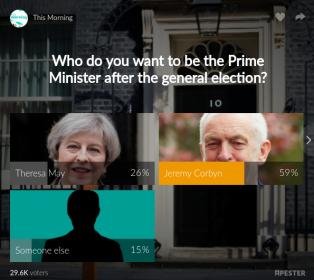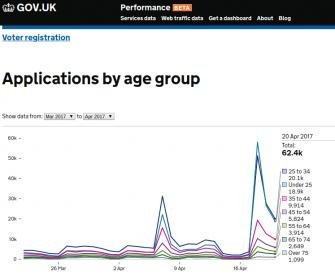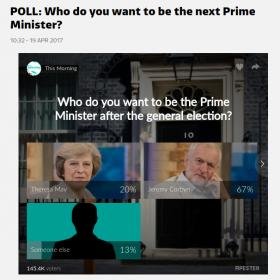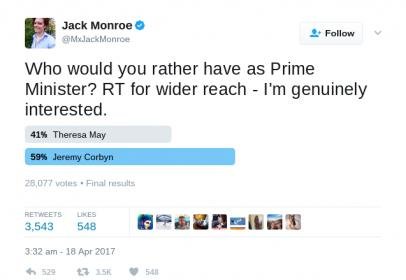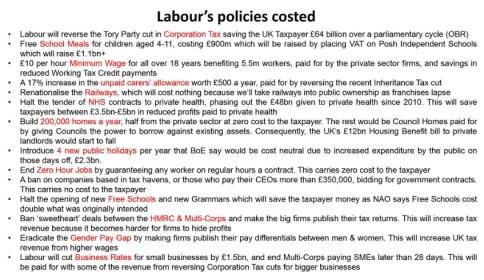Yossarian
Test Debutant
- Joined
- Jan 15, 2007
- Runs
- 13,897
- Post of the Week
- 1
I'm going to go against the general consensus and play the Devil's advocate:
* Don't forget that 48% of the public voted Remain. How many of them will now be prepared to vote for the Tories and 'hard' Brexit?
* The Tories are not going to pick up extra seats in Scotland (they currently have one MP in Scotland), Wales or Northern Ireland.
* So in order to get a majority of around 100, the Tories will need to pick up around 45 seats net (ie allowing for some losses to the Liberal Democrats, especially in the South West where the Tories took the seats from the Liberal Democrats in 2015, with relatively small majorities), meaning picking up 60 odd seats from Labour - all of them in England.
* Most of the Labour seats left after the 2015 disaster are large majority Labour core seats. The 'not 100% comitted Labour' voters already left in 2010 and 2015. Meaning not many of the core Labour voters still around after 2015 are now going to switch to Tory, including those who voted for Brexit.
* Some aspects of a hard Brexit are already being seen/ being admitted as not going to work out as the Brexiteers were told. e.g. Brexit Secretary David Davis himself admitted that EU immigration numbers (a key factor for Brexit voters) are unlikely to reduce much.
* Some Labour arguments against Tory policies (eg grammar schools, NHS) are in sync with voters concerns, whilst some Labour policies are popular with voters.
* Part (albeit not all) of the reason for Corbyn's unpopularity amongst voters is as the result of Blairites and many other Labour MP's having spent the last two years trying to get rid of Corbyn, even to the extent of wanting to lose council elections and Parliamentary byelections to make Corbyn look bad.
But now they will be forced to campain in support of Labour (and Corbyn since he's the Labour Party Leader) or risk losing their seats especially since Labour Party members/local activists (who are pro Corbyn) will not do the door-to-door donkey work for them otherwise.
And last but not least.
The right-wing media has been vehementally anti-Corbyn from the start. Either not giving him any publicity, or only giving him bad publicity by highlighting every little anti-Corbyn rant by anti-Corbyn Labour MP's. But now, under General Election rules, Corbyn and Labour have to be given the same amount of coverage as Theresa May and the Tories.
Yes, Theresa May and the Tories will win. But not by the massive margins forecast, especially if the polls start to narrow. (Tories need a lead of around 9% ahead of Labour in the polls just to maintain their current 10 or so majority!)
And all of that if nothing out of the ordinary takes place in the next 6 weeks (such as Trump bombing someone and starting a war that the UK public doesn't agree with, but Theresa May gives backing to Trump nevertheless)
Anyway, that my 'Devil's Advocate' argument. Now give reasons why you disagree with the above analysis.
* Don't forget that 48% of the public voted Remain. How many of them will now be prepared to vote for the Tories and 'hard' Brexit?
* The Tories are not going to pick up extra seats in Scotland (they currently have one MP in Scotland), Wales or Northern Ireland.
* So in order to get a majority of around 100, the Tories will need to pick up around 45 seats net (ie allowing for some losses to the Liberal Democrats, especially in the South West where the Tories took the seats from the Liberal Democrats in 2015, with relatively small majorities), meaning picking up 60 odd seats from Labour - all of them in England.
* Most of the Labour seats left after the 2015 disaster are large majority Labour core seats. The 'not 100% comitted Labour' voters already left in 2010 and 2015. Meaning not many of the core Labour voters still around after 2015 are now going to switch to Tory, including those who voted for Brexit.
* Some aspects of a hard Brexit are already being seen/ being admitted as not going to work out as the Brexiteers were told. e.g. Brexit Secretary David Davis himself admitted that EU immigration numbers (a key factor for Brexit voters) are unlikely to reduce much.
* Some Labour arguments against Tory policies (eg grammar schools, NHS) are in sync with voters concerns, whilst some Labour policies are popular with voters.
* Part (albeit not all) of the reason for Corbyn's unpopularity amongst voters is as the result of Blairites and many other Labour MP's having spent the last two years trying to get rid of Corbyn, even to the extent of wanting to lose council elections and Parliamentary byelections to make Corbyn look bad.
But now they will be forced to campain in support of Labour (and Corbyn since he's the Labour Party Leader) or risk losing their seats especially since Labour Party members/local activists (who are pro Corbyn) will not do the door-to-door donkey work for them otherwise.
And last but not least.
The right-wing media has been vehementally anti-Corbyn from the start. Either not giving him any publicity, or only giving him bad publicity by highlighting every little anti-Corbyn rant by anti-Corbyn Labour MP's. But now, under General Election rules, Corbyn and Labour have to be given the same amount of coverage as Theresa May and the Tories.
Yes, Theresa May and the Tories will win. But not by the massive margins forecast, especially if the polls start to narrow. (Tories need a lead of around 9% ahead of Labour in the polls just to maintain their current 10 or so majority!)
And all of that if nothing out of the ordinary takes place in the next 6 weeks (such as Trump bombing someone and starting a war that the UK public doesn't agree with, but Theresa May gives backing to Trump nevertheless)
Anyway, that my 'Devil's Advocate' argument. Now give reasons why you disagree with the above analysis.






